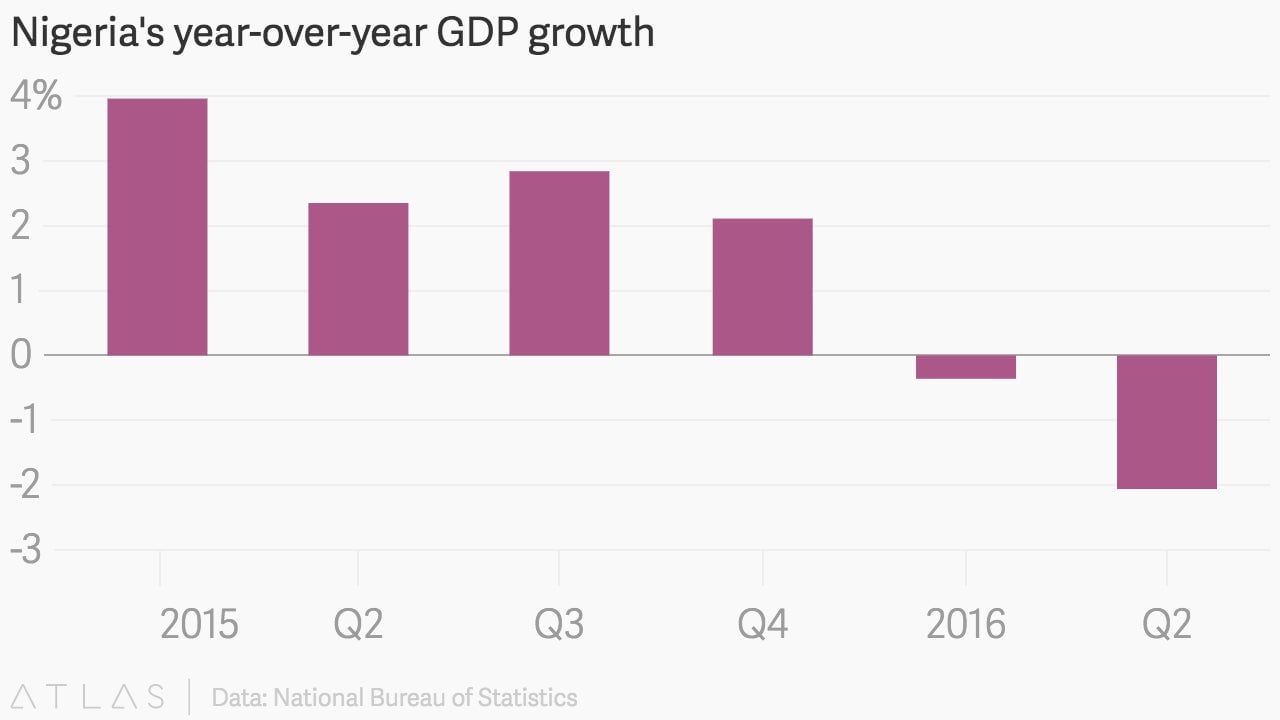Gabon’s shutdown, Nigeria’s slip, South Africa’s Afro
Hi, Quartz Africa readers!

Hi, Quartz Africa readers!
[insertSponsor]
Making his Mark
There were many things to admire about Mark Zuckerberg’s visits to Nigeria and Kenya this week. First was the element of surprise. It caught a lot of very well-placed and well-sourced people off guard. It probably was why we were saved from the ‘traditional’ dancers on airport tarmacs and other African photo ops that should have gone with the 20th century.
Then there was the focus on his actual area of expertise in technology. (Not a borehole in sight!). His visit centered around meeting and inspiring startup and tech leaders in Lagos and Nairobi along with young coders just at the beginning of their journey.
Zuckerberg has, of course, put his money where his mouth is and backed developer training and outsourcing company Andela. He supports the idea young Africans have an important role to play in the future of global technology.
Frankly, this was all great. His advisors—especially the folks we’re fondly calling Facebook’s “Nigerian mafia”—did a great job. However, because you’re expecting it, here’s that touch of cynicism.
Facebook and Zuckerberg learned some hard lessons from the mishap in India with Free Basics, the zero-rated internet program which Indian regulators blocked in February. Being prevented from offering some version of free internet in one of the world’s biggest markets, prompted an almost churlish response from Zuckerberg and there was some backlash. One imagines Facebook doesn’t want this to happen again.
His charm offensive this time started with the influential players in the local tech communities in Lagos and Nairobi. (Side note: Facebook’s only Africa office is Johannesburg). Specifically for Nigeria, a country where the government probably has more influence on a citizen’s daily affairs than it should, Zuckerberg made sure to stop over and meet with ‘Oga’ in Abuja.
Yes, Free Basics is already up and running in Nigeria, but having key stakeholders on board is smart strategy because, as Zuckerberg found out again this week, even the best laid plans can blow up.
Yinka Adegoke, Quartz Africa editor
Five stories from this week
Kenyan SMEs got what they wanted, but… Small and medium-sized businesses in Kenya have long complained of the eye-watering interest rates demanded by local banks. So when the Kenyan government introduced new interest caps, many rejoiced. But Joshua Masinde finds it isn’t quite that simple and some banks still aren’t ready to lend.
Gabon at a crossroads. Gabon’s national assembly was set ablaze last week following the declaration of president Ali Bongo as the narrow winner of the presidential elections. His rival Jean Ping called the results a “joke,” and called on the government to release election results in all polling stations. The government shut down the internet, with Gabon Telecom, which routes 91% of the country’s IP addresses, going offline.
In South Africa, hair is political. A 13-year-old girl with an Afro forced South Africans to reckon with racist school policies. Rigid attitudes and rules that ban Afros and police black students in South African schools are a dangerous holdover from apartheid, says Lynsey Chutel.
What do we really mean by ‘sub-Saharan Africa’? Media outlets, UN agencies, and aid organizations all use the term ‘sub-Saharan Africa’ to varying degrees of meaning. As Max de Haldevang writes, the reason behind this is because the term is as geographically confusing and inaccurate as it is historically loaded. It’s time, he says, for some nuance around the use of the term.
Promoting local languages to get Africa online. Despite the increased access to mobile and telecom infrastructure across Africa, internet adoption still lags in many countries. Abdi Latif Dahir reports that some of these limitations are due to language barriers, which keep many Africans, particularly the poor, off the grid.
Chart of the Week
For the first time in decades, Nigeria officially slipped into recession, writes Yomi Kazeem. Less than 24 hours after the recession was officially announced, it claimed its first casualty: Aero Contractors, Nigeria’s oldest working airline, indefinitely suspended operations, cutting off more than a thousand workers. The result of dropping oil prices and exports, the recession worsens the outlook for the continent’s largest economy.

Other things we liked
The professor turned rebel commander. Ethiopian exile, Berhanu Nega was once one a popular professor at a US college. Unbeknownst to many, Nega was also the intellectual leader and principal fundraiser of Ginbot 7, a political organization opposed to the Ethiopian government, and whose proxy army helped Eritrea against Ethiopia. As Joshua Hammer writes in the New York Times, Nega has traded his life in the United States, to lead the revolutionary force in the Horn of Africa nation.
African businesses need stronger audit systems. The economic collapse of 2008 exposed how many African companies colluded with auditing firms to hide misdemeanors in their accounts, writes Ndubuisi Ekekwe for the Harvard Business Review. Ekekwe says there’s a need to strengthen and create innovative digital auditing systems.
Keep an eye on
Emerging technologies and global development (Sept. 10).
Professor Calestous Juma will
aimed at mapping emerging technologies that could address challenges facing the world. The one-day conference, at the Harvard Kennedy School, is centered around the findings of Juma’s new book, “Innovation and its enemies: Why people resist new technologies.”
Climate action in the Mediterranean (Sept. 8).
Morocco will host a conference on
in Rabat. The talks will discuss climate change adaptation, mitigation and climate finance ahead of the official COP22 scheduled to take place in Marrakech in November.
Our best wishes for a productive week ahead. Please send any news, comments, affordable Kenyan loans and Afro puffs to [email protected]. You can follow us on twitter at @qzafrica for updates throughout the day.